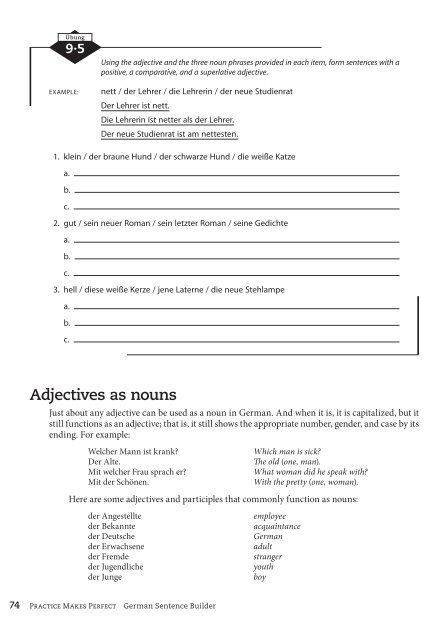german_sentence_builder
Create successful ePaper yourself
Turn your PDF publications into a flip-book with our unique Google optimized e-Paper software.
Übung<br />
9·5<br />
Example:<br />
Using the adjective and the three noun phrases provided in each item, form <strong>sentence</strong>s with a<br />
positive, a comparative, and a superlative adjective.<br />
nett / der Lehrer / die Lehrerin / der neue Studienrat<br />
Der Lehrer ist nett.<br />
Die Lehrerin ist netter als der Lehrer.<br />
Der neue Studienrat ist am nettesten.<br />
1. klein / der braune Hund / der schwarze Hund / die weiße Katze<br />
a. <br />
b. <br />
c. <br />
2. gut / sein neuer Roman / sein letzter Roman / seine Gedichte<br />
a. <br />
b. <br />
c. <br />
3. hell / diese weiße Kerze / jene Laterne / die neue Stehlampe<br />
a. <br />
b. <br />
c. <br />
Adjectives as nouns<br />
Just about any adjective can be used as a noun in German. And when it is, it is capitalized, but it<br />
still functions as an adjective; that is, it still shows the appropriate number, gender, and case by its<br />
ending. For example:<br />
Welcher Mann ist krank?<br />
Der Alte.<br />
Mit welcher Frau sprach er?<br />
Mit der Schönen.<br />
Which man is sick?<br />
The old (one, man).<br />
What woman did he speak with?<br />
With the pretty (one, woman).<br />
Here are some adjectives and participles that commonly function as nouns:<br />
der Angestellte<br />
der Bekannte<br />
der Deutsche<br />
der Erwachsene<br />
der Fremde<br />
der Jugendliche<br />
der Junge<br />
employee<br />
acquaintance<br />
German<br />
adult<br />
stranger<br />
youth<br />
boy<br />
74 Practice Makes Perfect German Sentence Builder



